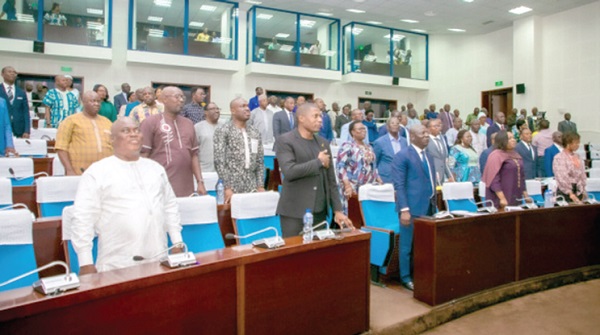
Togo revises constitution to eliminate term limits
Lawmakers in Togo have approved changes to the constitution linked to presidential term limits and how presidents are elected, which some opposition politicians and civil society groups have denounced as a constitutional coup.
Advertisement
The National Assembly from the ruling Union for the Republic (UNIR) party on Friday, April 19, approved a change to the Constitution, by a vote of 87-0 that eliminates citizens’ right to vote directly for the president of the republic.
Constitutional changes
The newly approved constitutional reforms restrict the power of the president who will no longer be elected by the people, but by members of parliament and establishes a new powerful executive position of President of the Council of Ministers. Elected by the National Assembly, this individual will effectively act as a Prime Minister overseeing the day-to-day operations of the government.
The President of the Council of Ministers will come from the party with the most seats in the legislature or lead a coalition of parties if there is no single-party majority. The term of office of the President of the Council of Ministers will be six years. However, as in a parliamentary system, this mandate is renewable indefinitely so long as the ruling power retains a majority.
2019 Constitution
This removes the stipulation of a limit of two five-year presidential terms, a key provision in the 2019 Constitution that had been adopted after widespread popular protests. The new Constitution retains a figurehead President who is subject to a four-year mandate renewable once.
With the passage of the reforms, Gnassingbe’s opponents fear he could not only be reappointed president until 2031 but could also then step down from the job and switch to the new role of “president of the council of ministers”.
Togo’s parliament had already adopted the amendments on March 25, but the reforms led to an opposition backlash so President Faure Gnassingbe called for further consultations and a second parliamentary vote.
The lawmakers gave final approval to the reform, just days before the April 29 legislative elections that had also been pushed back due to the issues around the constitutional amendments.
Presidential terms
The amendments shortened presidential terms to four years from five with a two-term limit. It does not take into account the time already spent in office, which could enable Gnassingbe to stay in power until 2033 if he is re-elected in 2025, a highly likely scenario as his party controls parliament.
Those opposed to the changes fear they could allow further extensions of the president’s 19-year rule and his family’s grip on power. His father and predecessor Gnassingbe Eyadema seized power in the coastal West African country via a coup in 1967.
The Dynamique Pour la Majorité du Peuple (DMP) opposition coalition and other signatories said the constitutional changes were a political manoeuvre to allow Gnassingbe to extend his tenure for life.
Civil Society organisations
However, a group of 17 Civil Society Organisations said the amendments amounted to a “project to confiscate power by a regime that is systematically opposed to any form of democratic change”, in a joint statement they issued this week. They also called on West Africa’s main political and economic bloc, ECOWAS, to take action in response.
“Time has shown us that the major concern of his regime is to preserve power by any means,” Nathaniel Olympio, president of the opposition party Parti des Togolais, said after the vote. “The function of president of the council gives someone the latitude to exercise power in an unlimited manner, so logically we believe that this is the position that he will hold for himself.”
Several other African countries, including the Central African Republic, Rwanda, the Republic of Congo, Cote d’Ivoire and Guinea, have pushed through constitutional and other legal changes in recent years allowing presidents to extend their terms in office.
The West and Central African region has also witnessed eight military coups in the past three years with violent police crackdowns on political demonstrations being routine under Gnassingbe, as they were during his father’s long rule.
President Faure Gnassingbe
Togo, a nation of around eight million people, has been ruled by the Gnassingbe family for nearly six decades. and the current President was just six months old when his father, General Gnassingbe Eyadema, seized power in 1967, a few years after participating in the country’s first postcolonial coup in 1963. His rule was characterised by brutality, his forces were accused by Amnesty International of massacring hundreds after a fraudulent election in 1998.
When Eyadema, “le patron” (the boss), died in 2005, the military moved swiftly to install his 38-year-old son, Faure Gnassingbe, in the presidential palace, preserving a dynastic system stretching back nearly six decades and provoking widespread fury. Standing with his Union for the Republic party (UNIR), he won elections shortly afterwards. However, the United Nations reported that security forces killed up to 500 people in the ensuing unrest.
Thousands of protestors
In 2017 and 2018, there were further bouts of deadly unrest. Thousands of protestors gathered in the streets of Lome, the Togolese capital, to demand that Gnassingbe step down following the two-term limit set in the original 1992 Constitution, a provision scrapped when parliament approved amendments removing presidential term limits in 2002.
As a sop to critics, the UNIR-heavy parliament passed amendments in 2019, allowing limits to be reimposed for presidential terms from that year onwards, thus paving the way for the president’s re-election in 2020 and 2025. Gnassingbe clinched a fourth term in the latest poll, with runner-up Agbeyome Kodjo, who once served as his father’s prime minister, crying foul.
He and other opposition members accused the government of using fake polling stations and stuffing ballot boxes.





